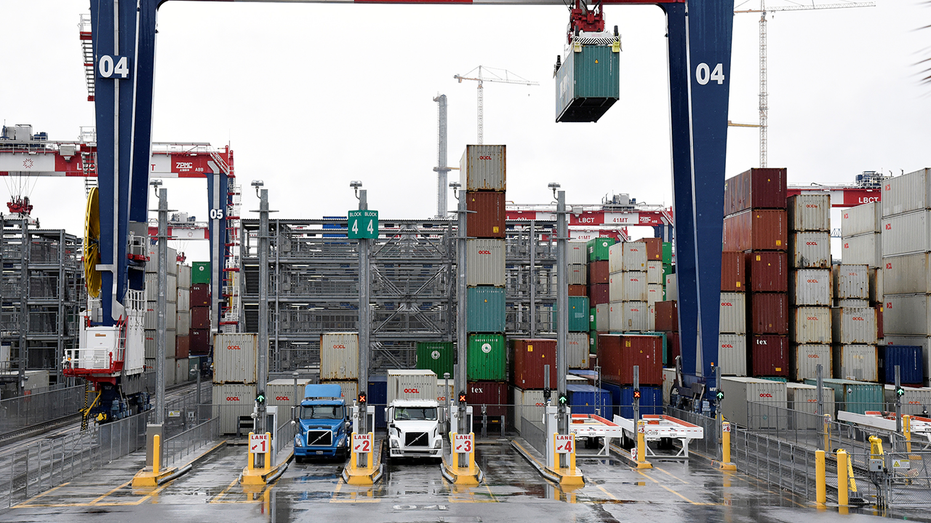US economy shrank 1.4% at beginning of 2022, marking worst quarter in 2 years
Economists expected the economy to expand by 1.1%, a marked slowdown from 2021
Harvard economist on 'shocking' contraction of US economy in Q1
Harvard University professor Kenneth Rogoff, a former chief economist at the International Monetary Fund, tells 'Mornings with Maria' that GDP falling at a 1.4% annualized rate is 'even below the worst' he thought it might have been.
The U.S. economy cooled markedly in the first three months of the year, as snarled supply chains, record-high inflation and labor shortages weighed on growth and slowed the pandemic recovery.
Gross domestic product, the broadest measure of goods and services produced across the economy, shrank by 1.4% on an annualized basis in the three-month period from January through March, the Commerce Department said in its first reading of the data on Thursday.
COLLAPSING TRUCKER DEMAND COULD FORESHADOW LOOMING RECESSION
Refinitiv economists expected the report to show the economy had expanded by 1.1%. It marked the worst performance since the spring of 2020, when the U.S. economy was still deep in the throes of the COVID-induced recession.

People shop for groceries at a supermarket in Glendale, California, Jan. 12, 2022. (Robyn Beck/AFP via Getty Images) / Getty Images)
"Today’s shock drop in GDP is a wake-up call that the economy isn’t as strong as we all thought," said Chris Zaccarelli, chief investment officer for Independent Advisor Alliance. "It’s possible that GDP gets revised higher next month, as this is just the first release and there will be two revisions, but it is a warning sign."
The headline figure often obscures the whole picture because the Commerce Department calculates the GDP on a quarter-over-quarter basis as if that level of growth were sustained for a full year; in times of huge swings up or down, it can exaggerate both the decline in growth and the subsequent rebound.
Looking at the quarterly data, the nation's GDP declined by about 0.3% from the fourth quarter to the first quarter, compared with an increase of 1.68% between the third and fourth quarter.

Containers are seen at the port in San Pedro, California, March 22, 2018. (Reuters/Bob Riha Jr. / Reuters Photos)
The substantial downturn stems from a widening trade deficit, with the U.S. importing far more than it exported: In the three-month period from January to March, imports surged by nearly 20% as businesses and consumers bought more goods from abroad. But exports fell about 6% – an imbalance that widened the trade deficit.
The U.S. also saw a slower pace of inventory investment by businesses in the first quarter, following a surge in investors at the end of 2021 as companies restocked in anticipation of the holiday-shopping season.
But key pillars of the economy – consumer spending and business investment – remained solid last quarter: Businesses and consumers boosted their spending by 3.6% at the start of the year, compared with 6.1% last year. Another bright spot in the economy is the jobs market. Unemployment fell to 3.6% last month, the lowest level since the pandemic began in February 2020, and jobless claims have continued to fall amid an exceptionally tight labor market.
"Huge miss on GDP this morning, but just looking at headlines is misleading," said Cliff Hodge, chief investment officer for Cornerstone Wealth. "We’d rate the report neutral overall. Trade, inventories and government spending all dragged, but the consumer held up and business investment was strong."

Shoppers walk through a store at Tysons Corner Mall in Tysons, Virginia, on April 2, 2022. (Stefani Reynolds/AFP via Getty Images / Getty Images)
The latest data comes amid growing fears on Wall Street that a recession is looming in the next two years as a result of the Russian war in Ukraine, soaring inflation and an increasingly hawkish Federal Reserve. With the consumer price index at a 40-year high, the U.S. central bank is moving quickly to raise rates in an effort to cool demand.
Fed policymakers hiked the benchmark federal funds rate by 25 basis points in March and have since telegraphed that steeper, 50-point rate hikes are "on the table" at upcoming meetings, beginning in May.
GET FOX BUSINESS ON THE GO BY CLICKING HERE
The new challenges have prompted economists to downgrade their expectations for the year. The International Monetary Fund said in its latest World Economic Outlook that global domestic gross product will grow by 3.6% this year, a 0.8 percentage point drop from its January estimate.
Fed Chairman Jerome Powell has pushed back against concern that further tightening by the central bank will trigger a recession and has maintained optimism that the Fed can strike a delicate balance between taming inflation without crushing the economy.
GET FOX BUSINESS ON THE GO BY CLICKING HERE
Still, he acknowledged the difficulty of the task ahead and said it is "absolutely essential" for central bankers to restore price stability.
"Our goal is to use our tools to get demand and supply back in sync, so inflation moves back into place, without a slowdown that amounts to a recession," Powell said during a recent panel discussion with the IMF and the World Bank. "I don't think you'll hear anyone at the Fed say that's straightforward and easy. It's going to be challenging."





















